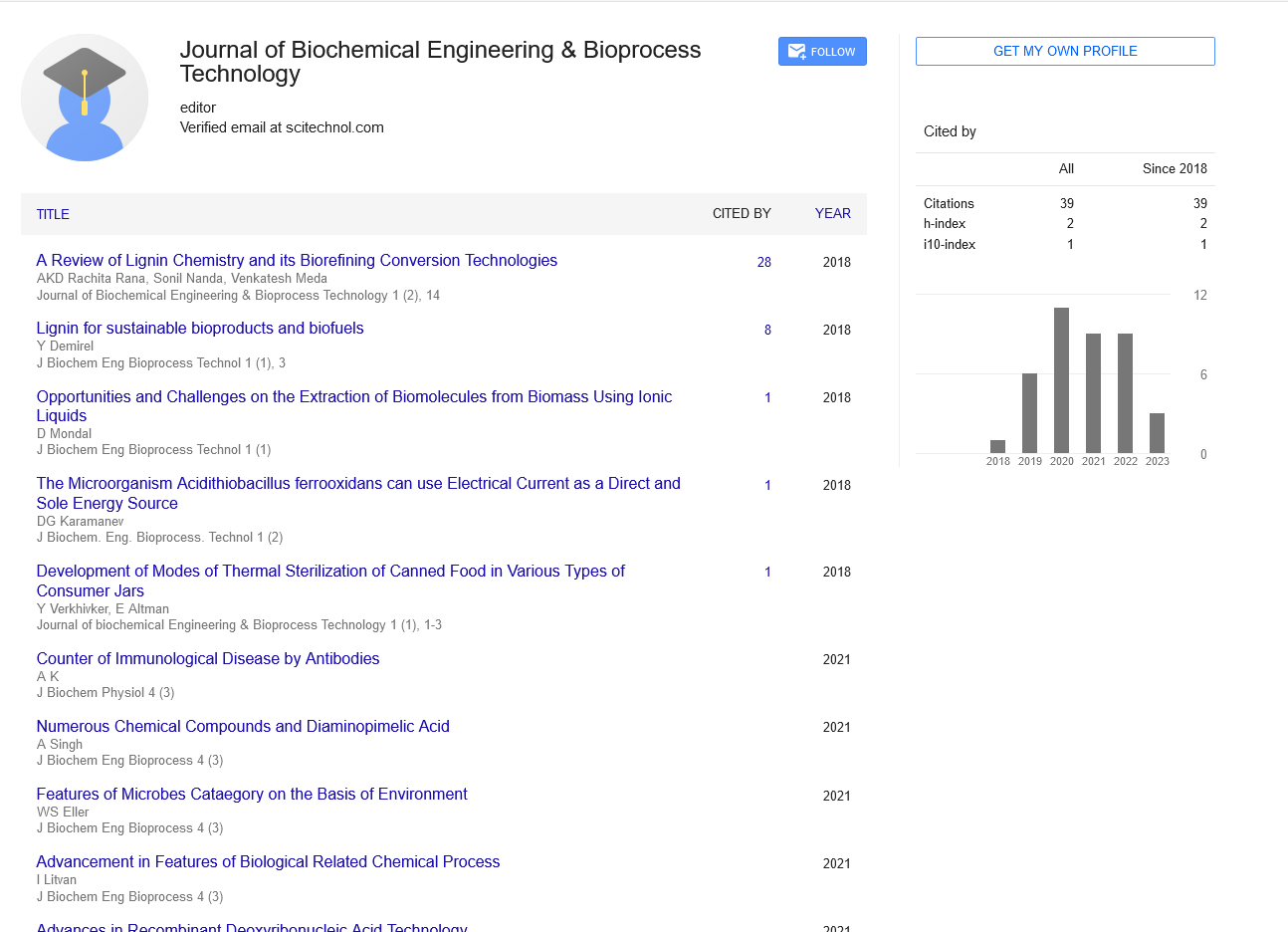Opinion Article, J Biochem Eng Bioprocess Vol: 6 Issue: 2
Microbial Systems Engineering: Harnessing the Power of Microorganisms for Bioprocess Technology
Jing Hui*
1Department of Biochemical Engineering & Bioprocess Technology , Tsinghua University , Beijing , China
*Corresponding Author: Jing Hui,
Department of Biochemical Engineering &
Bioprocess Technology, Tsinghua University, Beijing, China
E-mail: huijing@gmail.com
Received date: 22 May, 2023, Manuscript No. JBEBT-23-106942;
Editor assigned date: 24 May, 2023, Pre QC. JBEBT-23-106942 (PQ);
Reviewed date: 15 June, 2023, QC No. JBEBT-23-106942;
Revised date: 22 June, 2023, Manuscript No. JBEBT-23-106942 (R);
Published date: 29 June, 2023, DOI: 10.35248/jbebt.1000066
Citation: Hui J (2023) Microbial Systems Engineering: Harnessing the Power of Microorganisms for Bioprocess Technology. J Biochem Eng Bioprocess 7:2.
Keywords: Bioprocess
Description
Microbial systems engineering involves the design and optimization of microbial systems for various bioprocess technologies. This study provides a brief overview of the recent advancements in microbial systems engineering and explores the applications of microorganisms in bioprocessing. It discusses the strategies employed in microbial strain engineering, synthetic biology, and metabolic engineering to enhance microbial performance, improve product yields, and expand the range of products produced. Furthermore, the study highlights the potential of microbial systems engineering in various fields, including biofuel production, bioremediation, and pharmaceutical manufacturing, and emphasizes its role in driving sustainable and environmentally friendly bioprocess technology.
Microbial strain engineering: Tailoring microorganisms for specific tasks
Microbial strain engineering involves the modification of microbial genomes to improve their characteristics for specific bioprocesses. This section explores the strategies employed in microbial strain engineering, including gene overexpression, knockout, and introduction of foreign genes. It discusses the use of genetic tools and techniques, such as CRISPR-Cas9, to precisely edit microbial genomes. Additionally, it highlights the importance of selecting and optimizing microbial hosts to achieve desired traits and improve process efficiency.
Synthetic biology: Designing customized microbial systems
Synthetic biology offers powerful tools and methodologies for designing and constructing customized microbial systems. This section discusses the role of synthetic biology in microbial systems engineering, including the design of genetic circuits, biosensors, and regulatory elements to control microbial behavior and optimize bioprocesses. It explores the use of standardized genetic parts and modular approaches for the construction of complex microbial systems. Furthermore, it highlights the potential of synthetic biology in developing novel functionalities and expanding the capabilities of microbial systems.
Metabolic engineering: Redesigning microbial metabolism
Metabolic engineering aims to rewire microbial metabolism to enhance the production of desired compounds. This section discusses the strategies employed in metabolic engineering, such as pathway engineering, flux analysis, and cofactor engineering. It explores the use of genetic manipulation and optimization of metabolic pathways to improve product yields and increase the efficiency of bioprocesses. Additionally, it highlights the integration of computational tools and systems biology approaches in guiding metabolic engineering strategies.
Applications in bioprocess technology
Microbial systems engineering finds applications in various fields of bioprocess technology. This section provides examples of successful applications, including biofuel production, bioremediation, and pharmaceutical manufacturing. It discusses the use of engineered microorganisms for the production of biofuels, such as ethanol, biodiesel, and biogas. It also explores the potential of microbial systems in bioremediation, where microorganisms are used to degrade pollutants and clean up environmental contaminants. Furthermore, it highlights the role of microbial systems engineering in pharmaceutical manufacturing, enabling the production of therapeutic proteins, antibiotics, and other valuable pharmaceutical compounds.
Sustainability and environmental considerations
Microbial systems engineering plays an essential role in promoting sustainability and environmentally friendly bioprocess technology. This section discusses the advantages of microbial systems over traditional chemical processes, such as reduced energy consumption and lower environmental impact. It explores the potential of microbial systems in waste valorization, carbon capture, and circular economy approaches. Furthermore, it highlights the importance of considering ecological and sustainability aspects during the design and optimization of microbial systems.
Conclusion
Microbial systems engineering is at the forefront of bioprocess technology, harnessing the power of microorganisms for various applications. Recent advancements in microbial strain engineering, synthetic biology, and metabolic engineering have revolutionized the field, enabling the design and optimization of microbial systems for improved performance and product yields. Microbial systems find applications in biofuel production, bioremediation, pharmaceutical manufacturing, and other fields, contributing to a sustainable and environmentally friendly approach to bioprocess technology. Continued research in microbial systems engineering capacities to unlock new functionalities, expand the range of products, and drive the development of a bio-based economy.
 Spanish
Spanish  Chinese
Chinese  Russian
Russian  German
German  French
French  Japanese
Japanese  Portuguese
Portuguese  Hindi
Hindi 